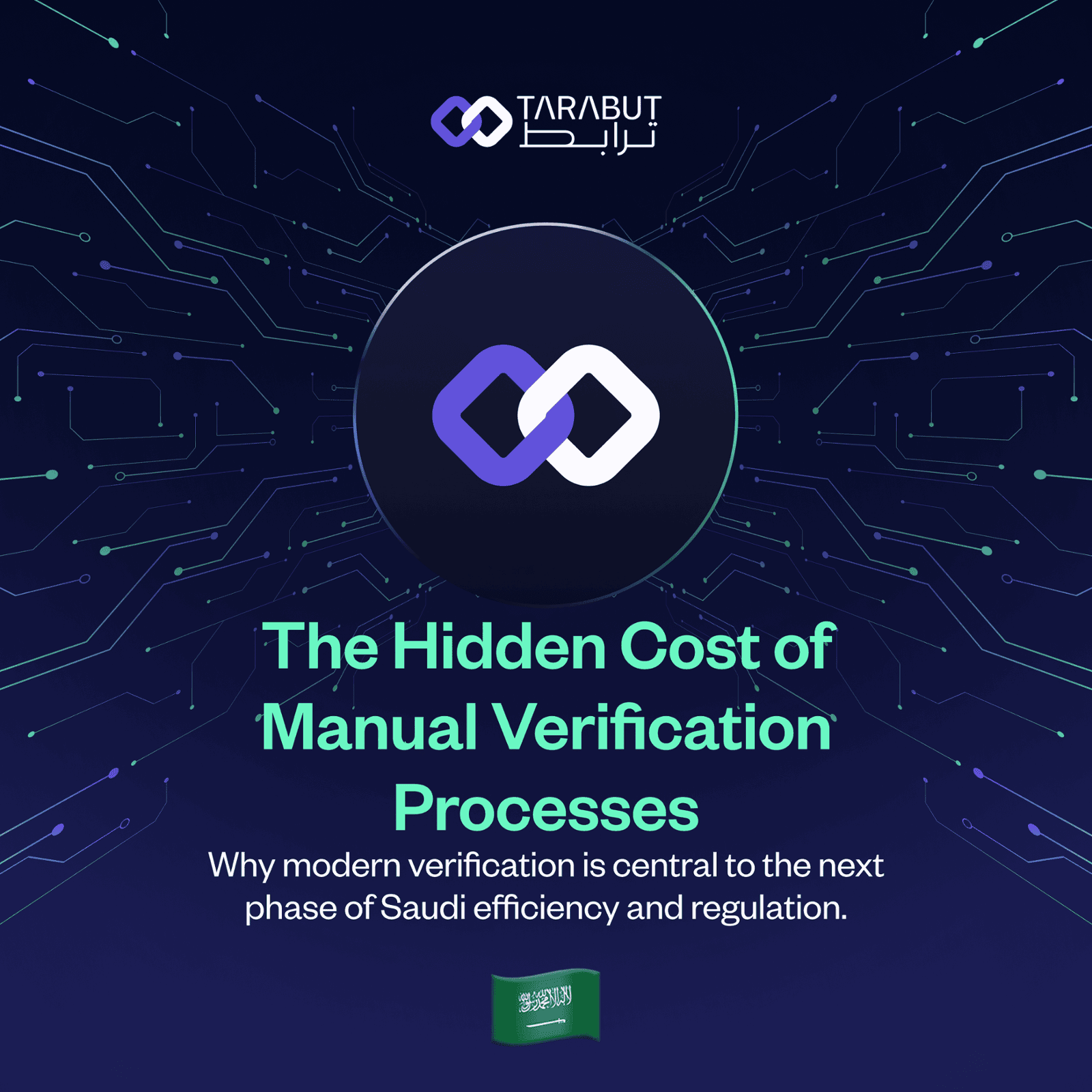Manual verification has quietly become one of the most expensive inefficiencies in modern finance. Beneath the surface of every delayed payment, reconciliation error, or compliance review lies the same root cause: outdated account validation processes that no longer match the speed or scale of today’s financial ecosystem. These legacy workflows slow operations, introduce risk, and limit the efficiency that the Kingdom’s Vision 2030 transformation demands.
At Tarabut, we see first-hand how accuracy and automation are reshaping financial infrastructure across the region. As the Kingdom accelerates toward a cashless economy, with electronic payments representing 79% of all Saudi retail transactions in 2024, the ability to verify accounts instantly isn’t a nice-to-have; it’s a business necessity.
The Real Cost of Manual Verification
Manual account verification has become one of the most underestimated drains on operational efficiency.
- Globally, failed payments cost the economy an estimated $118.5 billion in 2020 - in fees, labour, and lost opportunities.
- A third of these failures stem from account data errors: mismatched IBANs, incorrect names, or outdated records.
- In Saudi Arabia, where the cards and payments market is expanding at an expected 8.5% CAGR through 2030, every delay or reversal multiplies across thousands of transactions.
Every time an organisation manually validates an IBAN certificate or cross-checks account data, it introduces friction – not just in operations, but across compliance, customer experience, and financial control. Over time, these micro-inefficiencies compound into measurable financial and reputational cost.
The Operational Ripple Effect
- Financial Leakage
Failed or reversed payments generate immediate losses from reconciliation labour and reversal fees to delayed settlements. Liquidity remains locked while corrections are processed, restricting cash flow and slowing the business cycle. - Limited Scalability
Manual handling doesn’t scale. As Saudi institutions expand to serve millions of customers, paper-based or file-based validation quickly becomes a liability. What worked for hundreds of transactions collapses under the volume and velocity of modern finance. - Reputational Risk
According toLexisNexis, 60% of organisations globally have lost customers due to payment errors or delays; in high-volume industries, that figure rises to 80%. In Saudi Arabia’s fast-evolving fintech, insurance and banking ecosystem, where customer trust is a competitive currency and a regulatory expectation, even a single failed disbursement can undermine confidence and credibility.
Why Instant Verification Changes Everything
Instant account verification replaces manual validation with secure, API-based automation, addressing these challenges head-on:
- Accuracy at scale: Matching an IBAN with a national ID in seconds removes the manual error factor entirely.
- Speed that drives performance: Implementation takes only a few hours; verification happens in real time, unlocking immediate operational impact.
- Regulatory alignment: Fully supports the mandate from the Saudi Insurance Authority, which requires insurers, brokers, and aggregators to verify customers’ IBANs before any disbursement - ensuring compliance without added friction.
- Cash flow efficiency: Payments are processed instantly, without reversals or delays, accelerating settlement cycles and improving liquidity management.
- Future-ready infrastructure: Instant verification creates a scalable foundation for more connected financial systems, enabling institutions to expand confidently into new digital services and payment models.
At Tarabut, we view instant IBAN verification as part of the Kingdom’s financial backbone. It is the trusted, invisible layer that enables institutions to move faster, operate securely, and serve customers with confidence.
Who Benefits Across the Ecosystem
IBAN verification has become an essential enabler for every sector across Saudi Arabia’s financial landscape:
- Lenders and Finance Companies: Reduce fraud and ensure funds reach the right customers every time.
- Insurers and Brokers: Automate claims and refunds while maintaining full compliance with the Saudi Insurance Authority’s verification requirements.
- Fintechs and Digital Wallets: Eliminate document uploads and build frictionless user journeys.
- Corporate and SME Platforms: Ensure payroll and supplier accuracy without slowing operations.
- Government and Public Entities: Guarantee secure, error-free welfare and subsidy disbursements at national scale.
Best Practices for Implementation
Saudi institutions adopting IBAN verification can realise impact quickly by following a few key principles:
- Integrate directly via backend API for a seamless, invisible customer experience.
- Start with high-volume use cases such as payroll, refunds, or claims to maximise ROI.
- Track performance metrics aiming for fewer than 1% manual exceptions.
- Leverage analytics to improve efficiency, identify recurring inefficiencies and strengthen process accuracy over time.
- Think beyond compliance: automation is not just a regulatory requirement but a strategic lever for scale and resilience.
For teams ready to explore the integration in practice, Tarabut’s developer documentation offers a step-by-step integration guide.
Explore the docs →https://docs.tarabut.com/reference/postaccountverification
Conclusion
Manual IBAN verification once served its purpose but today it’s a legacy process slowing the progress of a digital economy. As Saudi Arabia’s financial landscape becomes more connected, data-driven, and regulated, institutions can no longer afford inefficiencies that drain time, resources, and trust.
Automated IBAN verification ensures every payment goes where it should: instantly, securely, and confidently.
At Tarabut, we’re proud to power this next generation of financial infrastructure, helping Saudi institutions move faster, build smarter, and scale safely.
IBAN Verification by Tarabut is trusted by financial leaders and built for tomorrow’s ecosystem. Discover how it can transform your operations – contact our team to learn more.

Relevant releases

Finance is Being Rebuilt, and Saudi Arabia is Going to be the Blueprint
People like to call what’s happening in finance today “evolution.” I’d actually go one step further. What we’re seeing isn’t gradual. It’s a teardown and a rebuild. The old rails are being pulled up and new ones are being laid down.
